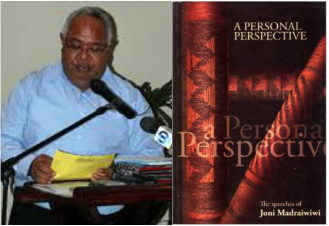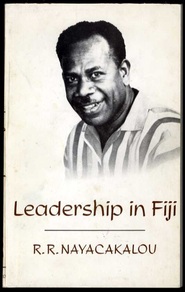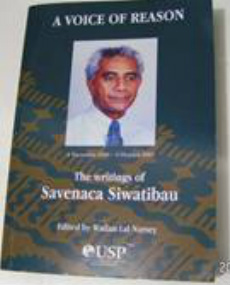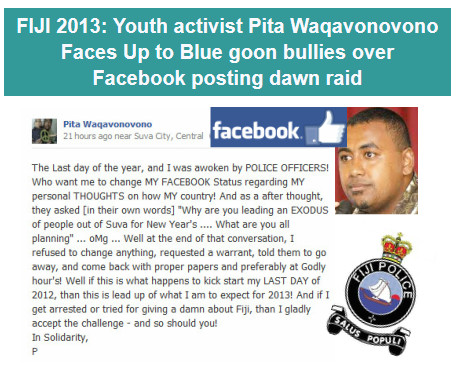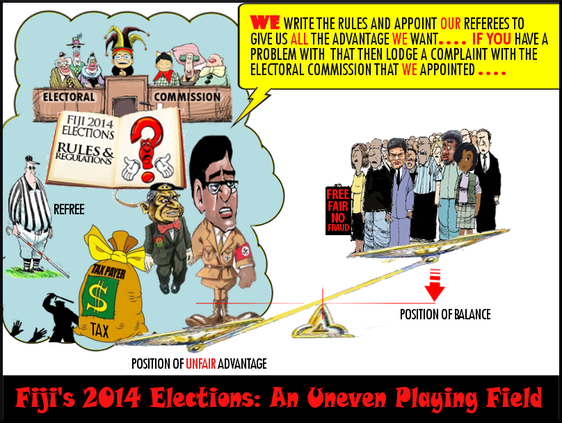 By Wadan Narsey Since independence in 1970, this last seven years have probably been the most earth-shaking for indigenous Fijians as a community, yet Fijian intellectuals seem to be in public hibernation. A military dictatorship, with unknown advisers, is bringing about major changes to Fijian institutions: the Great Council of Chiefs has been supposedly abolished; provincial governance structures reorganized; the laws of management of communally owned Fijian land and marine resources (some with serious environmental impacts); flagship Fijian companies such as Fijian Holdings Limited have been reorganized; controls have been placed on Fijian churches and villages; Fijian cultural symbols are being changed by decree, without their consent. Massive changes in economic policy are affecting not just Fijians but all Fiji citizens in: taxation and expenditure of tax-payer funds, privatization and sale of public assets, restructuring of pension funds, controversial approval for new industries such as casinos and mines, a huge increase in public debt that must be paid for by future generations which will be increasingly indigenous Fijian, and much more. The views of the Bainimarama Regime leaders are prominent every day on radio, television and in the newspapers, with extremely limited coverage given to opposing political leaders. It is dismaying therefore that there is a deafening silence from Fijian intellectuals from the universities and the private sector- with the exception of a few rare individuals such as Ratu Joni Madraiwiwi or young youth leaders like Peter Waqavonovono. One may well ask, where are the Rusiate Nayacakalaus, Jo Kamikamicas, Savenaca Siwatibaus, Amelia Rokotuivunas and Sir Kamisese Maras, of today? Hibernating intellectuals? It is natural that ordinary indigenous Fijians look to indigenous Fijian intellectuals at the universities, corporate entities and non-government organizations for guidance and debate on their major societal issues. Yet indigenous Fijian academics, corporate types and the plethora of legal professionals appear to be lying low. In a pattern repeated from the seventies, senior Fijian academics at USP (and now FNU) happily allow themselves to be promoted into sterile administrative work, or export themselves to universities abroad. Also largely absent are the voices of Fijian senior corporate types from the private and public sectors, currently working in Fiji or abroad, or retired. Even prominent Fijian intellectual political leaders (of whom the electorates expected better), disappeared out of sight (leaving Qarase to cop the flack alone) or joined the bandwagon. Are these intellectual leaders (Missing in Action) secretly discussing these issues amongst their communities? Or are they waiting to see who are going to be the winners, before they jump on the winning band-wagon? The curse of entertainment and blogging Is it a coincidence that most of our media organizations (television, radio and newspapers), are diverting the largest part of public discourse into entertainment- sports (rugby sevens), Bollywood and Hollywood, singing competitions, and religious frenzy. Policy debates are raised quite rarely, and even then in totally innocuous fashion, without the attention they deserve. One phenomenon of our times, with mixed blessings, is the massive rise of anonymous blogging (by all ethnic groups), where the calm rational voices are totally outnumbered by nasty posts, often racist and violent in nature. Is the ability to blog anonymously dissipating the energies of Fijian intellectuals, thereby ensuring that they make little attempt to engage in honest public debates using their own names? The real misfortune is that the anonymous blogs are usually read largely by the “converted” and not those whose minds have not been made up, but are daily being influenced by the media which is currently dominated by Regime propaganda. I suspect also that even the rational educative blogger is ineffective, since anonymity robs the views of their full effectiveness. Who will dispute that a public statement by Savenaca Siwatibau or any other respected Fijian leader, would have a far greater impact than an anonymous Letter to the Editor or a similar but anonymous blog posting? Of course, having views unpopular with those in power, must come at some personal cost, as it does everywhere in the world. | But are indigenous Fijian intellectuals as a group choosing a totally wrong balance between active transparent social responsibility and self-seeking self-preserving “culture” of silence? Silence is not golden Elections will be held within the next eight months and political candidates of all persuasions will be expressing their views in trying to influence the outcome of the elections. It would be of great help to indigenous Fijian voters (and others) if politically neutral Fijian intellectuals from the universities, private and NGO sectors, were to actively express their views on national policy matters which will become election issues, whichever political side their views happen to fall. Silence from our Fijian intellectuals at this critical juncture in Fiji’s history, is not going to be golden. It certainly has not helped the Fijian community so far. http://narseyonfiji.wordpress.com/2014/01/23/the-hibernation-of-fijian-intellectuals-22-january-2014-2/ |
Letter to the Editor (Fiji Times, Fiji Sun, Island Business, Republika)
22 January 2014
The Electoral Commission and “rubber stamps”?
Dear Sir
It might reassure some that the Electoral Commission has announced that it will not be a “rubber stamp” for the Bainimarama Government. Unfortunately, some members come with historical baggage.
Some of the Commission members were part of the National Council for Building a Better Fiji, which produced the People’s Charter, the first paragraph of which declared that the 1997 Constitution would be supreme.
However, when the Court of Appeal 2009 judgment declared the Bainimarama Government to be illegal, Bainimarama purportedly abrogated the Constitution, with not a single public protest from the members of the NCBBF, including some who are now members of the Electoral Commission.
Not only were they betrayed, but so also were the hundreds of thousands of the Fiji public who supposedly signed up in support of that Charter “referendum” organized by John Samy.
The public notes that contrary to the requirements of the 2013 Bainimarama/Khaiyum Constitution (BKC), the Commission members have all been appointed by Bainimarama without any consultation with other political parties, and most are either open or closet supporters of his regime.
One member of the Commission, through her accounting company, is clearly also playing ball with the Bainimarama Government in what economists would see as a totally undesirable distortion of the Permanent Secretary salary structure, announced just two weeks prior to the last budget.
Nevertheless, the public can still give these Commission members the benefit of the doubt and hope that as otherwise decent individuals, they will do their utmost to ensure free and fair elections as is required by the 2013 BKC, and not be used as a “rubber stamp” by the Bainimarama Government.
The public hopes that the Commission members will also be collectively and individually accountable to the public in fully informing them, should any untoward pressure be placed on them during their work.
Lack of resources for their work cannot be taken as an excuse, given that the Bainimarama Government has had seven years to plan the elections, and in the last two years alone, has allocated a massive 1 billion dollars to road building. There should be no need at all to depend on or use donor resources, despite their willingness to assist.
Professor Wadan Narsey
22 January 2014
Ensuring a fair elections game
Dear Sir
It might reassure some that the Electoral Commission has announced that it will not be a “rubber stamp” for the Bainimarama Government but will do its utmost to ensure “free and fair” elections.
The current reality indicates otherwise.
In any free and fair “game”, the opposing teams play on a “level playing field” with no side having any unfair advantage, and both sides know exactly what the rules of the game are going to be decided independently, before they start the game.
By these criteria, the Electoral Commission is surely aware that the elections games are currently not fair at all: one side is appointing their own referee, while giving itself all the penalties and free kicks it wants.
First, the unelected Bainimarama Ministers can clearly be accused of using tax-payers’ money and donor resources, on a weekly basis to buy voter support, just as previous governments were accused of doing, such as through the Agricultural Scam.
Second, the media is clearly giving far more coverage to pro-Bainimarama statements (by ministers, supporters and editorials) than to Opposition voices.
Third, the Bainimarama Government still has not announced what exactly will be the rules of the elections game-i.e. the electoral system and regulations which they themselves are going to impose on the country (having dumped the independent Ghai Commission rules), leaving the political parties totally ignorant of the rules they will be playing under.
Fourth, by not announcing the exact elections date, the Bainimarama Regime is denying other political parties and civil society organisations the opportunity to properly plan their voter education campaigns and prepare their teams for the election games.
Fifth, they have unilaterally appointed their own electoral referees.
In contrast, Commodore Bainimarama and his advisory cabal, are no doubt well aware of the rules of the game they will be imposing on Fiji, and when.
There is clearly no level playing field for all parties facing the upcoming elections games.
To show the public that they are genuine about ensuring free and fair elections and not merely being “rubber stamps”, the Electoral Commission must publicly require the Bainimarama Government
(a) to immediately release details of the electoral system and regulations under which elections will be held.
(b) to announce when exactly they intend to hold the elections.
(c) to require ministers who are going to be candidates in the elections, to resign from government six months before the elections, to ensure that they do not use tax payers’ and donors funds for their campaigning.
(d) to require that the MIDA act immediately to ensure that there is political balance in the media reporting.
Professor Wadan Narsey
